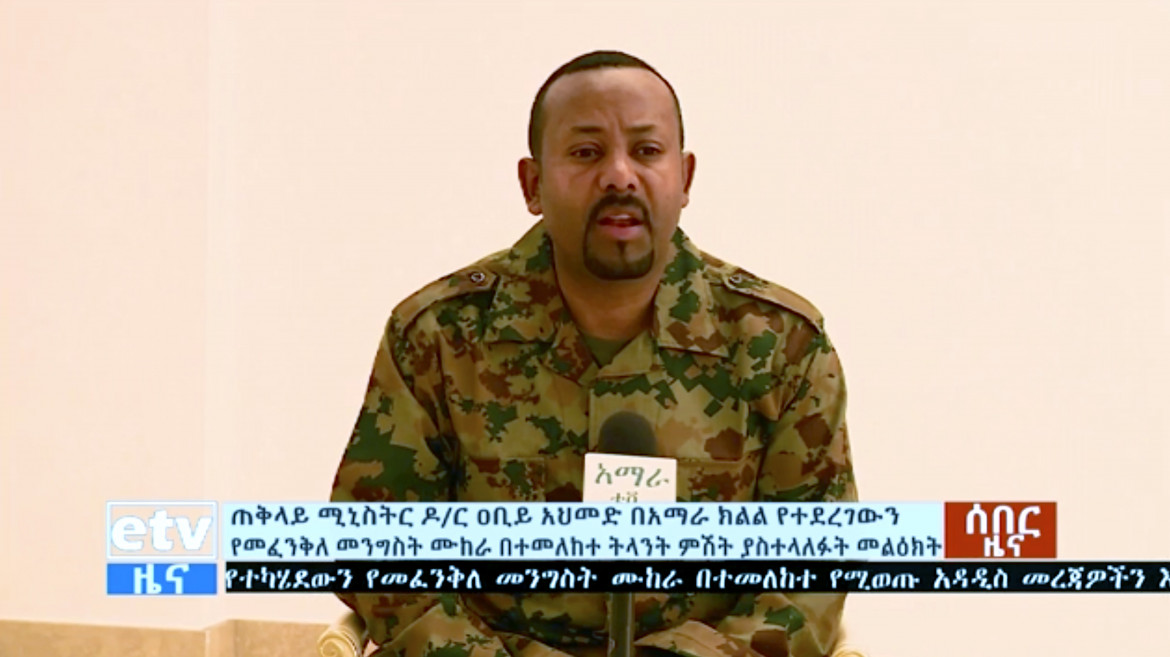Report
Ethiopia’s Abiy, Nobel peace prize winner, goes to war
Political violence in Tigray escalated last week, leading Prime Minister Abiy Ahmed to conclude the “national sovereignty and peace” was threatened. Both sides are well armed.

The heavy artillery fire that resounded on Friday morning at the border between Amhara and Tigray, in northern Ethiopia, confirmed the statements made on TV the night before by Ethiopian Prime Minister Abiy Ahmed, according to whom the military operation launched on Thursday against the forces of the Tigray People’s Liberation Front (TPLF), in response to the attack against a federal army base in Dalsash that caused “many martyrs, injuries and property damage,” is encountering “success.”
So the operation continues, and according to the Prime Minister it is set to take on a wider scope, despite widespread fears that the escalation may come with heavy casualties, as well as an unexpected wave of refugees. “The red line has been crossed,” Ahmed said, without giving any more details about the ongoing fighting and stressing he would only provide all the information once the operation is completed.
The governor of Tigray, Debretsion Gebremichael, who on Friday declared a “state of war,” denounced the aggression of the federal army and special forces of the neighboring Amhara region. But at the same time, he showed a belligerent sense of self-assuredness: “They should not attack the Tigrinya population in Tigray. Now we are well armed, perhaps better armed than they are.”
The clashes also involved the Tigrinya capital, Mekelle. The headquarters of the Northern Command of the Federal Army is located on its outskirts, with the best-equipped weapons depot in the region. On Friday, the local special forces still had control of the structure.
So far, these have been the dramatic and evolving developments arising from a crisis that has faraway origins and more recent triggers. The rift last September, when regional elections were held in Tigray despite the decision taken by the central government in Addis Ababa to postpone the vote due to the COVID emergency, marked a point of no return.
And as a result, Prime Minister Ahmed, who was awarded the Nobel Peace Prize last year thanks to his brilliant success in ending the long-running conflict with Eritrea, did not hesitate to send in troops in order to settle the score with the TPLF—in his words, to “defend national sovereignty and peace.”
In this endeavor, the Ethiopian Prime Minister has the support of the other states of the federal republic: starting with “his own” Oromia, whose president, Shemelis Abdissa, expressing full support for the Prime Minister’s military response, has once again accused the TPLF of arming the most extreme fringes of the Oromo Liberation Front (OLF), bringing up once again the prospect of an alliance between historically inimical forces aimed at destabilizing the country, fueling inter-ethnic clashes and blocking Ahmed’s reformist push. The latter accused the fact that this process has regained strength after the bloody clashes following the murder of the famous singer Hachalu Hundessa in June.
For now, the strongest international pressure on the situation comes from the U.S. State Department: amidst electoral pandemonium, Mike Pompeo has found time to express his sorrow about the victims and call for a ceasefire. On the African chessboard, Addis Ababa remains a strategic ally of Washington. But Trump’s recent negative comments on the Ethiopian Renaissance Dam—as Friday marked yet another failure of the ongoing negotiations on the mega infrastructure project that would solve the energy problems of Ethiopia, but is seen by Egypt as a threat to its agricultural production—and the idea entertained by the White House that al-Sisi could lose patience and bomb the dam on the Blue Nile have made the relationships significantly colder. This is also why Ahmed is pushing ahead.
Originally published at https://ilmanifesto.it/il-nobel-per-la-pace-ahmed-va-alla-guerra/ on 2020-11-06
